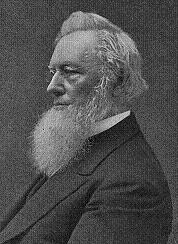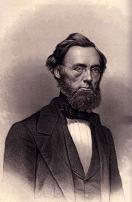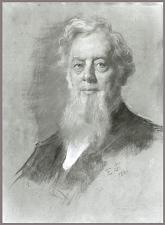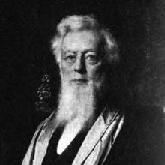Frederick Augustus Porter Barnard, AAAS's biography
"Proceedings
of the American Academy of Arts and Sciences", New series Vol. XVI, 1889,
pages 441-445
(you can click on the images to enlarge them)
See also this
other biography
 Fredrick Augustus Porter Barnard (Sheffield 1809 - New-York 1889)
Fredrick Augustus Porter Barnard (Sheffield 1809 - New-York 1889)
President
of Oxford University Mississippi, from 1856 to 1858, and Chancellor from
1858 to 1861
President of Columbia College, New-York (now Columbia
Univ.) from 1864 to 1889
... and author of the first perfect
magic cubes of order 11 published in 1888
Fredrick Augustus Porter Barnard was born in Sheffield, Massachussets, on
May 5, 1809. He died in New York on April 27, 1889. He was descended on his
father's side from Francis Barnard of Coventry, Warwickshire, England;
and on his mother's side from John Porter of Warwickshire, who emigrated
to Massachussets in 1628.
In 1886 he furnished to a magazine an interesting article on "How
I was educated." After receiving some elementary instruction from his
mother, he was sent, with a sister two years older, to the village school in
Sheffield. At six years of age, he had read from Shakespeare, Cowper, Burns,
Addison, etc., and began the study of Latin. When nine years old, he lived for
a time at Saratoga Springs with his grandfather, General B. P. Porter,
afterwards Secretary of War under John Quincy Adams. At his leasure,
he learned the art of printing so effectually that he might have supported himself
by it had circumstances compelled him. From Saratoga Springs he went to Stockbridge,
Mass., and became interested in scientific studies. He entered Yale College
in 1824, and gratuated honorably in 1828. Thirty years after his graduation
he delivered the annual oration before the society of the Yale
Alumni. After some experience in teaching at the Hartford Grammar School,
he served as Tutor at Yale in 1830. In those days young graduates of the College
were broken in for tutors at Hartford. Having an apprehension of deafness, which
was in the family and which had begun to reveal itself in his own case, he connected
himself, in 1831, as instructor with the Asylum for Deaf and Dumb at Hartford,
and a year later with a similar institution in New York. He originated a system
still used in institutions for the deaf and the dumb, and published an analytic
grammar with symbolic illustrations. His leasure he devoted to the study of
theology, and to writing for the Hartford Review, which the poet Whittier
lasted for sixty years, and was recognized by the poet in 1870 by dedicating
to him his "Miriam". It was a graceful and generous compliment
which the great poet paid to the President of Columbia College when he wrote
that in those old days of the early acquaintance Dr. Barnard had a greater chance
of distinction even in literature and poetry than himself.

In 1837 Dr. Barnard accepted an appointment as Professor of Mathematics and
Natural Philosophy in the University
of Alabama; in 1848 he became Professor of Chemistry. Meanwhile resuming
his theological studies, he took orders in the Episcopal Church. In 1854 he
went to Oxford University in
Mississippi as Professor of Mathematics and Astronomy. In 1856 he was elected
President ; a title changed in 1858 to Chancellor. While in the South, he urged
the claims of science to a higher place in a liberal education. In the agitation
between Northern and Southern viens in regard to California, and other burning
questions of the day, he spoke boldly for the Union. On July 4, 1851, he delivered
an address at Tuscaloosa, and wrote a patriotic ode. At the outbreak of the
civil war he found himself in a delicate position ; he resigned his place in
the University in 1861, and sought to return North, but was refused a passport
by Jefferson Davis. For a time he was not permitted to leave the Confederate
States, but finally was allowed to go to Europe. On his journey, by the way
of Fortress Monroe, he was stopped at Norfolk, where he remained until the city
came in the hands of the Union army. Going then to Washington, he found friends
and employment. In 1862 he was engaged on the reduction of Gilliss's observations
on southern stars, under the Director of the Naval Observatory. In 1863 he was
placed in charge of chart-printing and lithography for war maps in the office
of the U.S. Coast Survey.
In 1864, Mr. McCulloch, Professor of Physics
in Columbia College, N.Y., resigned, and linked his fortunes with the Southern
Confederacy. Professor Barnard applied for the vacant office ; but the Trustees
made him President.
President Barnard for many years had been interested in the improvement of
education of every grade, and had claimed for science its proper place in the
curriculum. At his accession to the presidency, the managers of Columbia College
were induced by him to enlarge the sphere of collegiate education by the establishment
of the School of Mines with an independent faculty. The friendly rivalry between
this department and the classical has invigorated both, and brought greater
numbers and more funds to the College. The centennial celebration of the revival
and confirmation by the Legislature of the State of New York of the Royal Charter
granted in 1754, which occurred on April 13, 1887, took place under circumstances
of great present prosperity, and of rich promises for the future.
The labors of Dr. Barnard were never limited by his professional duties.
When the American Astronomical Expedition was organized by the Superitendent
of the U.S. Coast Survey, under the authority of Congress, for the purpose of
observing the solar eclipse of July 17, 1860, Professor Stephen Alexander
was chief, and President Barnard one of a large corps of able assistants. Mr.
Alexander made the report on the observations taken on Cape Chadleigh in Labrador,
and Mr. Barnard furnished an account of them for the American Journal of
Science. In 1867 Dr. Barnard was appointed one of the U.S. Commissioners
to the Universal Exposition of Paris, and his report was printed by Congress.
He was also Assistant Commissioner General to the Exposition of 1878. He received
the Cross of Officer of Legion of Honor from the French Ministry, and a gold
medal for his work as editor in chief of Johnson's Cyclopaedia.

Dr. Barnard joined the American
Association for the Advancement of Science at the seventh meeting, held
at New York in 1846. He was elected President of the fifteenth meeting, which
was expected to convene at Nashville, Tenn., on April 15, 1861. But that meeting
was prevented by the impeding civil war. In 1866 Dr. Barnard thought that the
time had come for renewing the meetings, and, in co-operation with Joseph
Lovering, the Permanent Secretary, he arranged for a meeting in Buffalo,
beginning on August 15, over which he presided. Absence in Europe prevented
him from giving his valedictory address as retiring President at the next meeting,
in Burlington, Vt., but it was delivered at the meeting in Chicago in 1868.
In this address, after a comprehensive survey of recent advances in the science
of all the physical forces, in the widest meaning of that phrase, culminating
in the doctrine of the conservation and correlation of force, he strenuously
opposed the philosophy which confuses mental or moral power with physical force.
His last words were:
"In conclusion, gentlemen, thanking you for the kind attention
with which you have listened to me, permit me to congratulate you on the
cheering auspices under which you are once more assembled. You are here
in a strength which recalls the happy days when your Association was in
the zenith of its prosperity and its usefulness, and which justifies the
hope that a fresh career of still more fruitful labors and of higher services
to humanity is before it."
When, at a later day, the American Metrical Society was instituted, Dr. Barnard
was its President.
Although Dr. Barnard made no great discovery in science, his acquaintance
with it was accurate and of wide range. Besides many articles in the Cyclopaedia,
he published eleven papers in the American Journal of Science, and four
in the Proceedings of the American Association for Advancement of Science.
In 1859, as chairman of a committee of twenty, he made an elaborate report to
this Association on the History, Methods, and Results of the U.S. Coast Survey.
In 1860, he gave an interesting course of lectures in the Smithsonian Institution,
which were published in the Report of 1862. In 1869, he published "Recent
Progress in Science", and in 1871, a volume on the Metric System. Dr.
Barnard was no specialist; his love of knowledge included all the sciences,
mathematical, physical, and social; and with it was blended a love of poetry
and art. But above all and through all he was an educator. For sixty years education
was the great subject of his toughts and his professional activity. In early
life he published text-books on arithmetic and grammar for schools and colleges.
At a later period, he wrote a book upon Art-Culture. He was a frequent contributor
to Dr. Henry Barnard's Journal of Commerce and Education. His
essays and reports on collegiate and university education, and his letters on
college government, attracted attention throughout the country. Books and the
periodical and daily press equally served him for the dissemination of his independent
views. His pamphlet on University Education, addressed to the Trustees of the
University of Mississippi, was a plea for building up a university in this country;
an idea afterwards realized in more than one college, though at the time a voice
crying in the wilderness.

The value of Dr. Barnard's many services to science and education were recognized
bu academies and seats of learning. He was elected an Associate Fellow of the
American Academy of Arts and Sciences in 1860. He was included among those named
in the act of incorporation of the National Academy of Science by Congress,
in 1863, was chairman of an important committee on weights, mesures, and coinage,
and Foreign Secretary for a time. In 1871 he was chosen a member of the Philosophical
Society of Philadelphia. He was also a corresponding member of the Royal Society
of Liege. He received the degree of LL. D. from Jefferson College in 1855, and
from Yale in 1859; and the degree of S. T. D. from the University of Mississippi
in 1861. The Regents of the University of New York made him Doctor of Letters
in 1872.
It is understood that Dr. Barnard, devoted to the end to the cause of
education, and faithful to the College which had adopted and honored him, and
to which he had given twenty years of his ripened though, has left his whole
property (about 80,000 dollars) to Columbia College, to be available after the
death of Mrs. Barnard.
Return to the home page http://www.multimagie.com